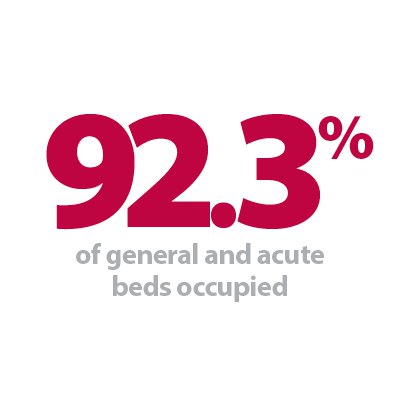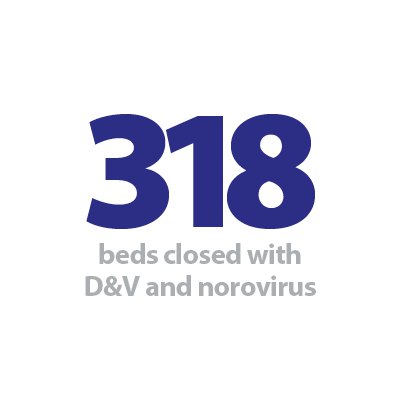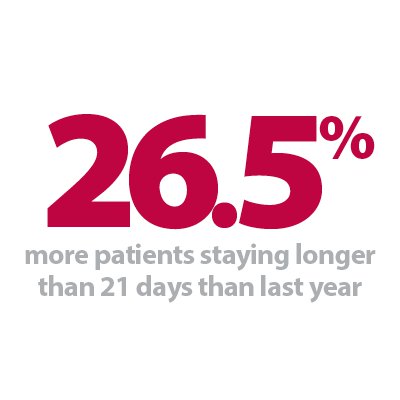


Today we saw the third week of the winter sitreps published by NHS England and NHS Improvement. The latest developments in the COVID-19 pandemic continue to impact the NHS and the continued surge in cases associated with the rapid spread of the Omicron variant is an ongoing concern for trust leaders.
Recent data (22 December) show over 95,000 COVID-19 cases in England alone, an increase of 39% since the week before. Hospital admissions and the number of patients in hospital have also seen increases of 55% and 11%, respectively.
On this third week of our NHS Winter Watch campaign, data highlight the ongoing pressures trusts are facing as the Omicron wave continues to rise.
Key headlines from winter sit reps (13 December – 19 December):
- Pressures on ambulance services have reduced slightly, with a total of 83,545 patients arriving by ambulance this week (405 fewer than last week).
- Ambulance handover delays also decreased this week, with 17% being delayed by 30 minutes or more (16,410 patients or 2,344 per day) and 7% of patients being delayed by 60 minutes or longer (up from 4.7% last year).
- A&E diverts decreased to 13 this week (15 less than last week) and remain considerably lower than the 26 registered this time last year.
- Adult critical care bed occupancy remained relatively stable at 80% but is still up from 77% last year.
- General and acute bed occupancy decreased since last week but remains high at 92.3% (up from 88.8% last year).
- Paediatric intensive care beds had occupancy rates of 81.2%, which is slightly up from 81.0% last week and considerably higher than the 66% observed last year. Neonatal intensive care bed occupancy rates also rose this week to 71.8% (up from 70.3%) and remain higher than the same time last year (65%).
- There continues to be more patients staying in hospital longer than seven, 14 and 21 days. These numbers all increased from the week before and are up by 18%, 19% and 26% since last year, respectively.
- The number of beds closed with diarrhoea and vomiting (D&V) and norovirus continued to increase this week to 318. This is considerably higher than this time last year (68).
These figures highlight the challenges that trusts are facing, not only from the usual winter pressures, but also due to the impact of the Omicron variant. Ambulance service figures reflect the ongoing demand, and while there was a slight decrease in ambulance arrivals this week, there were still 83,545 patients arriving by ambulance. Likewise, handover delays decreased from the previous week; however, these also remain high, with the number of patients delayed by 30 and 60 minutes both higher than this time last year.
Bed occupancy rates remain stable but are still high, with trusts having to manage COVID-19 patient care alongside ongoing workforce challenges. This week saw a considerable increase in the number of beds closed due to D&V as well.
As Omicron infections rapidly grow, it is expected that the numbers of COVID-19 admissions and hospitalisations will also rise, due to its highly contagious nature. In addition to this, an upsurge in cases will undoubtedly lead to staff shortages across the NHS, adding further pressure to this already challenging time. NHS staff continue to work relentlessly to deliver booster jabs and vaccinations; this week there were 4,611,191 total COVID-19 vaccinations delivered across England.
Staff absences show tangible real-time impact of Omicron
Responding to the latest winter reporting data from NHS England and NHS Improvement, the chief executive of NHS Providers, Chris Hopson said:
"These figures show how Omicron is having a tangible real-time impact on a service that was already operating beyond full stretch, through increased staff absences.
"This is a big worry for trust leaders who are doing all they can to support colleagues at this very challenging time.
"Absences due to COVID-19 are up nearly 40%, and with community infections surging ahead, that figure may well get worse before it gets better.
"The pressures on hospitals, mental health, community and ambulance services are intense.
"Hospital bed occupancy remains high, and despite some improvement, ambulance handover delays are a continuing cause for deep concern, reflecting wider pressure across the system.
"It's worrying to see delayed discharges have increased again for patients who are fit to go home or to other community settings.
"The next few weeks will present a huge test for the NHS on many fronts – coping with COVID-19, handling emergencies, working on the backlog where possible, and delivering boosters.
"Once again, staff are being asked to go the extra mile, working flat out through the holiday period.
"We owe them so much."